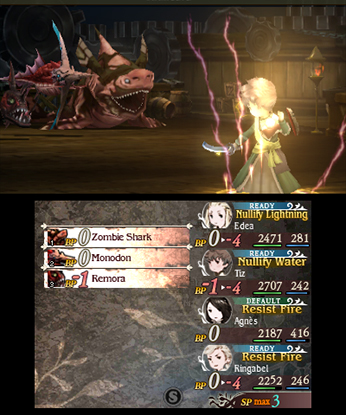In gaming, music can do more than sound good. It can give players information and help strengthen their emotional attachments to characters. Few have done this better than Bravely Default.
Bravely Default is a role-playing game that Square Enix created in 2012 for the 3DS (although it didn’t come out in the U.S. until 2014). It is a fantastic experience, simultaneously borrowing some of Final Fantasy’s best traits (like the Job system, which let characters master different classes and mix and match abilities) while employing its own unique ideas, including a battle system that lets players use turns themselves as a resource. It became a hit for Square Enix, selling over a million copies and spawning a sequel, Bravely Second, in 2016. But Bravely Default doesn’t just stand out because of its RPG mechanics. It also has one of the best soundtracks in recent gaming history.

Above: Getting ready for attack.
And it’s not just because the score is beautiful and exciting, which it certainly is. Composer Revo (yes, that’s his full name) combined the traditional fantasy music we’re used to from Final Fantasy with Celtic and rock and roll influences. But Bravely Default’s music also stands out because of how the game uses it.
YouTube channel Game Score FanFare looked at how the soundtrack empowers players in a video you can watch above. Every character in Bravely Default has their own theme song. This isn’t unusual for an RPG, but the innovation comes in when they play. During combat, each character can occasionally use a special attack. This will do a lot of damage or heal the party, but it also buffs all of the players. When you do this, the character’s respective theme song starts playing. The stat improvements last until the song ends, but players can extend them if they use another character’s special attack, starting a new tune and adding onto the buffs.
June 5th: The AI Audit in NYC
Join us next week in NYC to engage with top executive leaders, delving into strategies for auditing AI models to ensure fairness, optimal performance, and ethical compliance across diverse organizations. Secure your attendance for this exclusive invite-only event.
So, not only does each song represent each of the four heroes thanks to their instrumentation and catchy melodies, but they also have a gameplay purpose. They aren’t just a pretty thing to admire while going about the business of actually playing the game.
But my favorite thing about these four themes, which Game Score FanFare also covers, is how they return for an epic medley toward the end of the game’s final boss. This is during the song “Serpent Eating the Ground.” When the end of the game is in sight, the score grabs your emotional links to these characters and yanks as hard as it can. Listening to the song now still gives me chills.
https://www.youtube.com/watch?v=vOlWeP5t-40
An epic final boss song isn’t anything new. Final Fantasy has done it spectacularly with “Dancing Mad” from Final Fantasy VI and “One-Winged Angel” from Final Fantasy VII. But those iconic tracks are more about the bosses themselves than the party of heroes you’ve grown attached to. “Serpent Eating the Ground” is a musical reminder of the journey you’ve taken so far, while encouraging you to stick it out a little longer and win your way to the end.
Revo could not return to score the soundtrack for the sequel, Bravely Second: End Layer. His replacement, Ryo (again, that’s the full name), still delivered a great soundtrack, but it lacks the intense emotional punch that the original landed. Square Enix has not yet announced a Bravely Third, but if they do, I hope that Revo can return to try and one-up his work on Bravely Default.

